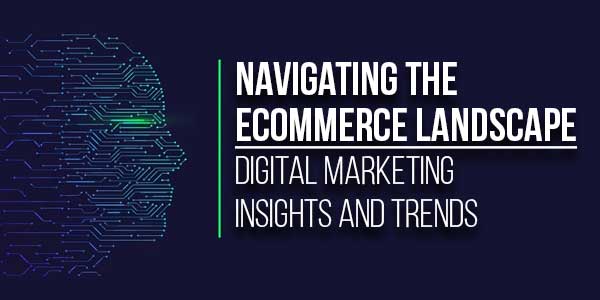
Are you ready to compete in the ever-changing eCommerce world? People want to be more visible and have a competitive edge online. The advent of online shopping has indeed changed the traditional mode of business. But what would your eCommerce store need to keep up with the competitive market?
This can be achieved through effective Digital Marketing. Setting up accounts on social media and posting ads is not the end of the story. It takes working smarter, new-age tools, mastery of clientele, and a rich knowledge of customer behavior.
Insights and strategies from the marketing world up to 2025 or beyond are what eCommerce businesses need to reach new heights, which are outlined in this article. From AI to social commerce, we will discuss steps you could easily implement on your e-commerce store.
Table of Contents
10 Must-Know Digital Marketing Trends for eCommerce Success:
To keep ahead in the fast-paced world of e-commerce. Make sure to pay attention to these ten digital marketing trends, which will take your eCommerce business to the next level.
1.) Shift Towards Personalised Experiences:
Personalisation has become crucial for successful digital marketing in e-commerce. Customers no longer respond well to generic messages. Consumers expect brands to understand customer demand and consistently serve tailored content sincerely. This encompasses customised email communications, targeted and encouraged ads, client-specific emails, and more.
AI is now integrated into most e-commerce platforms to track user behaviour and suggest relevant products. For example, returning customers that browse for shoes will have likely purchase similar items which will aid with conversion.
As well, personalization building trust which drives users to come back. By 2025, we expect this to increase even more. Companies that do not change will risk being ignored by modern shoppers.
2.) Voice Search is Gaining Ground:
Smart speakers and voice assistants such as Alexa and Google Assistant have made voice searches more common. Now, consumers ask queries such as, “Where can I buy organic coffee near me?” instead of looking it up on a search engine.
Voice search has to be included in digital marketers’ SEO strategies. This development calls for the use of ordinary speech and quoted phrases as keywords.
For e-commerce sites, FAQ pages and product descriptions are perfect candidates for optimisation for voice search, which will increase traffic. Maximising long-tail conversational keywords is also wise.
With more and more people getting used to using voice search, marketing will continue to be around this area.
3.) Mobile-First Shopping Experiences:
More than 60% of online purchases are made on mobile devices. E-commerce websites should focus on mobile layout and features. Pages should load quickly, menus should be easy to navigate, and the checkout process should be seamless.
Social media advertisements, email marketing, and even push notifications need to be tailored to mobile devices, so digital marketing campaigns should be mobile-friendly, too.
Mobile design offers must be user-friendly because mobile responsive design and accessibility are no longer optional.
Let’s address the obvious: if a page cannot be effectively navigated on a mobile device, the site will be abandoned. By prioritising Mobile, e-commerce brands can easily capture shoppers.
4.) The Rise of Social Commerce:
Social Media is no longer just for liking and posting; it’s morphing into direct sales avenues. Shopping features on Instagram, TikTok, and even Facebook allow purchases to be made without leaving the application.
Escapable social commerce strategies cannot be ignored in digital marketing plans. Popular tools include influencer marketing, live selling, and shoppable posts.
Brands can attain real sales by creating entertaining, helpful, and inspiring content instead of just showcasing the products. The buzzword is storytelling.
Younger audiences are expected to be the heaviest adopters of this trend because they spend the most time on social media.
5.) AI and Automation in Marketing:
The use of Artificial Intelligence (AI) is significantly impacting modern marketing. From customer interaction to analysing eCommerce data and proposing optimisations, AI is revolutionising the sector.
Automation assists in managing emails, operating scheduled campaigns, and monitoring user interaction. These functions increase output while simultaneously decreasing the time taken to complete the work, greatly improving efficiency.
AI collaborates in refining ad targeting accuracy. With customer data, it can forecast the optimal advertisement and its timing for maximum impact. This boosts ROI while minimising unnecessary expenditure.
AI tools do not facilitate a separation from the human element. Instead, brands can allocate their resources towards the imaginative sides of branding while machines tackle monotone tasks.

6.) Importance of Content Marketing:
Traffic is only the tip of the iceberg regarding the benefits that powerful content can bring to businesses. Trustworthiness is earned. Blogs, alongside how-to videos, serve as versatile tools for working in eCommerce, while user-generated content is great for retention.
Solving problems, answering questions, and adding value tackle multiple elements that represent good content. As a bonus, it also improves SEO and strengthens the brand’s image.
Video content is compelling. Product demos, behind-the-scenes videos, and customer testimonials can influence buying decisions. Adding a WooCommerce product video to your page can increase conversions and customer confidence.
Content marketing is not a one-time effort. It needs regular updates and a clear strategy. But when done well, it keeps your audience engaged and coming back.
7.) User-Generated Content and Social Proof:
Shoppers trust other shoppers, making user-generated content (UGC) an effective digital marketing weapon. UGC encompasses customer reviews, pictures and videos posted on social media platforms.
This type of content facilitates trust and motivates potential customers to make purchases. Having real customers endorse a product through everyday usage makes the product much easier to trust.
Ask satisfied customers to post reviews and photos through branded hashtags. Use them on the product pages and your brand’s social media handles.
Besides enhancing credibility, UGC improves your website’s SEO, boosting your ranking while increasing the on-site average time.
8.) Data-Driven Decision Making:
Today’s digital marketing landscape requires searching for valuable information, especially if you must promote a product through a specific segment. Understanding your purchasers’ interests, shopping times, and behaviours streamlines business decisions.
Google Analytics, Facebook Insights and heatmaps provide crucial information. This information can be used to decide on content strategy, ad targeting, and product selection.
You also learn best practices for A/B testing. To establish the most impact, you can test headers, images, buttons, and entire layouts.
Employing research reveals the marketing world’s guesswork. It leads to better decisions and campaigns that work.
9.) Email Marketing is Still Alive and Strong:
Emails still serve as a powerful digital marketing tool. Customers can be reached directly, and the return on investment is high.
Emails can be used to send updates, coupons, and product suggestions. Personalisation improves performance more than a generic approach.
Change the list of emails targeted to be based on behaviour, geo-location, or past purchases. Your email campaigns will be more relevant and effective.
To cover mobile optimisation, a clear message and strong CTA will improve clicks and sales.
10.) Preparing for Future Trends:
Constant shifts in the world of digital marketing make it essential for eCommerce businesses to scout for emerging trends.
Consider these somewhat developed topics for further analysis:
- Shopping with the aid of Augmented Reality (AR)
- Using blockchain for digital transactions
- Sustainability and ethically inclined branding
- Content generated by AI
- Tools for searching visually
It is crucial to keep an open mind and be ready to try new strategies. These strategies focus on building adaptable businesses that continuously learn.
Conclusion:
The eCommerce landscape continuously evolves; intelligent businesses that understand digital marketing strategies tend to surpass their competition. Effective AI utilisation, content creation, and mobile optimisation screenshot the trends listed here and indicate the future of online selling.
Artificial intelligence, voice search, and social commerce are just a few examples of how to deepen engagement with modern shoppers. Always remain willing to pivot, test new concepts, let the numbers guide you, and maintain plenty of flexibility.
Capitalise on these tools, whether you want to expand your online store or create one from scratch. This is the quickest, most reliable approach to achieving the objective. Direct funds towards your digital marketing strategy and watch your eCommerce business prosper before your very eyes.

 About the Author:
About the Author:












Great insights! This blog perfectly captures the evolving landscape of digital marketing in 2025. I especially liked the focus on AI, voice search, and personalized content these are game changers for marketers today. Looking forward to seeing more trend-based articles like this. Keep up the good work.
Welcome here and thanks for reading our article and sharing your view. This will be very helpful to us to let us motivate to provide you with more awesome and valuable content from a different mind. Thanks again.